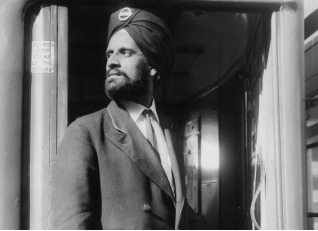
Amar Singh turned up for work every day for three weeks but was sent home and marked absent every single time (Image: Central Press/Getty Images)
History
The history making London Underground train guard who fought to wear his turban
Qasim Peracha
One of London's greatest strengths is its multiculturalism. It is estimated that a third of Londoners were born outside the UK, while walking on the streets of London, you can hear around 200 languages being spoken.
This hasn't just enriched the capital economically but also culturally and gastronomically, elevating its status as the best city ever. But things have not always been easy for those who have come to call London their home.
Balancing one's faith, beliefs and practices with life in London may seem easy now but this is only thanks to the sacrifices and struggles of heroes before us. One such hero was Southall man Amar Singh, who worked on the London Underground.
Amar Singh, from India, started working as a train guard on board Central line trains in 1962. At the time, he lived in Hambrough Road, just off Southall Broadway at a time the Ealing town was becoming known as "Little India".
Train guards used to operate doors, patrol trains and could be called on in case the driver fell ill or could not continue his route. A clean-shaven Amar Singh wore his flat-peaked cap to work from the Acton depot for two years.
But when Amar decided he wanted to be more in touch with his religion, transport officials suspended him without pay. Under the Sikh religion, cutting of the hair and beard is forbidden and men are encouraged to wear a turban, an incredibly strong symbol of spirituality and devotion.
While working as a train guard, Amar decided to grow out his hair and beard. During the swinging 60s in London, this was hardly a rarity but when Amar decided to swap his guard's cap for a turban he was told not to come in to work.
His black turban was chosen to coordinate with the uniform and he took the London Transport badge from his cap and pinned it to the centre of his turban.
But officials at London Transport, the predecessor to Transport for London, were unimpressed with the change in uniform and said Amar would have to wear the standard uniform.
For three weeks, Amar wore his new uniform with turban to work and every single day he was marked as being absent and turned away as the bosses would not change their mind or bend the rules.
Across England, prayer meetings were held in Sikh communities for Amar to get his job back. The story made the national and local newspapers at the time, bringing awareness of the issue to more communities than ever before.
He told the Mirror during the battle: "I wore a peaked cap for more than two years. I had my hair cut and I shaved like an Englishman.
"But I could not go on - my conscience was tormenting me. I decided to let my hair and beard grow again.
"When my hair looked like a Beatle's I put it in a turban. But at work I was told this was not allowed."
He told a news agency he "was surprised at this religious discrimination".
"London Transport seem to be trying to starve me into submission, because they haven't sacked me and will not release me," he added after losing £30 in wages. That is more than £500 in today's money.
London Transport replied that "the case has been presented the wrong way around".
"We are not interested in religion or colour. Singh has worn his uniform for two years. We simply told him he cannot wear a turban on duty," they added.
However just days later, the bosses acquiesced and said he would be allowed to wear the black turban as long as it bore the London Transport badge.
A spokesman even told the Mirror "we won't be unsympathetic towards a request by him for the his pay for the time he has been absent".
However when asked if other Sikhs would be able to wear a turban and work for London Transport, the spokesman said Amar Singh's was a "special case".
Today, bus drivers, Tube staff and other workers across the network are open to wear turbans, hijabs, beards, crosses and any other symbols of their religion while working to keep our capital running.
But few remember the name Amar Singh - the hero who made huge sacrifices for religious freedom in London.
[Courtesy: MyLondon]
Februrary 13, 2022


